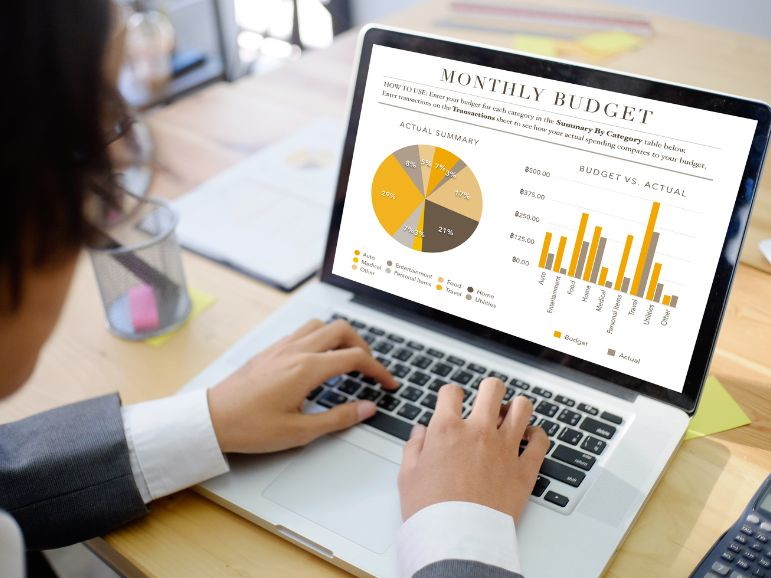Business Intelligence from Microsoft
Power BI is a collection of services that enable data from unrelated sources to be transformed into coherent, interactive and visually appealing analysis, then shared with all or selected team members. The wide-ranging capabilities of a business intelligence system allow companies to turn big data into valuable business information. With the help of analysis and reports, we can get information on all areas of the company. Among other things, the Power BI system makes it easier to estimate costs, calculate sales levels, analyze ongoing marketing campaigns, or study the effectiveness of distribution over a given period. The efficient and convenient creation of reports, in turn, increases the efficiency of operations.
In developing Power BI (whose name refers to Business Intelligence), the Microsoft team drew heavily from technologies previously developed for Excel. This is because the solution uses such custom-built mechanisms as Power Query (total data), Power Pivot (data processing) and Power Map and Power View (data visualization).

Application of Power BI in business
One of the key challenges companies face is data analysis to control company processes. Based on the collected information, it is possible to create – efficiently and automatically – reports on business activities. Such solid analysis is the basis for companies to implement innovative solutions and make strategic decisions.
Business intelligence tools, led by Power BI, are very useful in business. They are gaining popularity among many companies, regardless of the scale and industry in which they operate.
Here are some examples:
Power BI in finance and banking:
- Customer portfolio analysis: Banks are using business intelligence systems to analyze customer behavior, allowing for accurate personalization of financial offers. This allows them to increase sales of financial products by up to about 10-20%.
- Predictive risk analysis: Predicting credit risk based on customer financial data can reduce defaults by up to 15-20%.
- Monitoring market trends: Analysis of economic and financial data enables you to track market trends and make quick investment decisions. Decision support systems are reliable in this role.
Retail business intelligence system:
- Sales analytics: Retail companies can use Power BI to analyze sales data to help identify purchasing trends and optimize assortment.
- Demand forecasting: With advanced predictive models, it is possible to forecast product demand, allowing better inventory management and avoiding overstocking.
Use of a business intelligence system in the manufacturing industry:
- Monitoring machine performance: Power BI allows you to continuously monitor the operation of production machines and equipment, which can reduce downtime by 20-30%.
- Quality management: Data analysis allows quick detection of product quality problems and prevention of defects at the production stage.
Business intelligence systems in healthcare:
- Patient data analysis: Power BI enables analysis of medical data, which can improve patient diagnosis and treatment and reduce healthcare costs.
- Prevention: By analyzing epidemiological data and patient behavior, it is possible to anticipate increased periods of disease and take preventive measures.

Application of business analytics in education:
- Monitoring student progress: Power BI can be used in educational systems to monitor student progress, identify areas of need and adjust curriculum.
Business intelligence system in transportation and logistics:
- Route optimization: Transportation companies are using Power BI to optimize routes and manage their fleets, which can lead to fuel savings of up to 10-20%.
- Vehicle condition monitoring: By analyzing telematics data, the condition of vehicles can be monitored and the need for maintenance can be predicted.
It is worth noting that Microsoft Power BI can be customized to meet the specific needs of each industry and bring real benefits in the form of time and resource savings, process optimization and better understanding of business data. Thanks to the growing amount of available data, business intelligence tools are becoming an indispensable part of business strategies in various sectors.

Microsoft Power BI capabilities
Microsoft Power BI is one of the most popular and rewarding tools in its field. The key capabilities of the system are:
- Compare data from a variety of sources – Excel spreadsheets, ERP and CRM systems, email marketing systems, social media, streaming data, cloud-based services and more.
- Present data on a single dashboard – easy to view data with customizable views. Crucially, the data is available on both desktop computers and mobile devices.
- Preparation of interactive reports – efficient creation of clear reports with an interesting layout. Finished reports are immediately visible to team members, making work easier.
Power BI’s intuitive drag-and-drop interface makes data processing and report creation extremely easy even for those with little technical knowledge.

Power BI – implementation with the help of EBIS experts
Are you looking for a modern tool for comprehensive data analysis and visualization? Bet on Power BI, with the help of which you will gain constant insight into the data, while making the resulting conclusions accessible and understandable to all company employees.
At EBIS, we are very familiar with the Power BI system, so we customize its parameters to meet our clients’ individual needs and expectations. Contact us for a dedicated implementation offer.
Power BI – FAQ
What is Power BI?
Power BI is an advanced data analysis tool developed by Microsoft. It allows the collection, processing and visualization of data in an extremely efficient and intuitive way. Power BI allows you to create interactive reports that allow you to quickly and accurately understand the information contained in your data.
Power BI consists of several key components:
1. Power BI Desktop
Power BI Desktop is an application for creating reports and interactive visualizations. It allows you to combine different data sources, create advanced charts and tables, and add filters and interactive elements to reports.
2. power BI Service
Power BI Service is an online platform where you can share your reports. You can also create dashboards and share access to data with other users. It’s ideal for team collaboration and information sharing.
3. Power BI Mobile
Power BI Mobile is a mobile application that allows access to reports and visualizations on smartphones and tablets. You can track data and make decisions even when you are out of the office.
Why use Power BI?
Power BI offers many benefits that can significantly improve the efficiency and effectiveness of your business. Here are some reasons why you should invest in this tool:
1. data visualization
Power BI allows you to create attractive and clear data visualizations. This makes it easier to understand information and detect patterns and trends.
2. ease of use
The Power BI interface is intuitive and easy to use. Even people without technical expertise can create reports and analyze data.
3. linking data sources
Power BI allows you to combine data from different sources, such as databases, spreadsheets and online applications. This means you can analyze all relevant information in one place.
Frequently asked questions about Power BI
Question 1: Is Power BI paid for?
Yes, there is a paid version of Power BI, but Microsoft also offers a free version of the tool. The paid version offers more advanced features and more cloud storage.
Question 2: Is Power BI difficult to learn?
No, Power BI is relatively easy to learn, especially with the available documentation and online tutorials. It is worth taking the time to learn, as knowing how to use this tool can bring many benefits.
Question 3: Which companies should consider implementing Microsoft PowerBI?
Power BI is useful for companies in various industries and of varying sizes. Both small businesses and corporations can use this tool to analyze data and make better decisions.
